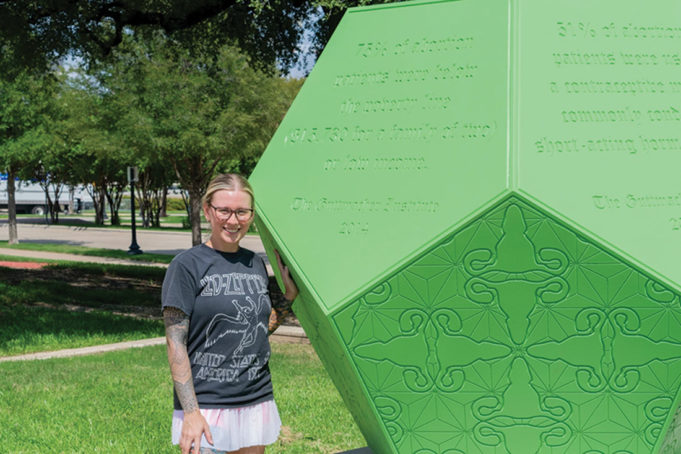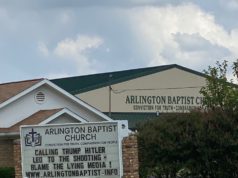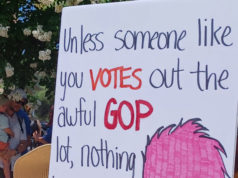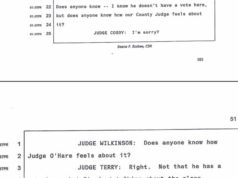In the Cultural District, near the entrance to the Fort Worth Community Arts Center, a green spherical polyhedron sits covered with messages etched on several of its panels, one of which reads, “About one in four women (24%) will have an abortion by age 45.”
Created by Fort Worth’s Sarah Ayala last year, “F**k the Supreme Court” is one of dozens of works of public art throughout the city and, as a taxpayer-funded initiative, is completely protected by the First Amendment.
That doesn’t mean everyone’s happy with it.
Earlier this year, Councilmember Michael Crain fielded a constituent complaint about the public artwork before forwarding the angry email to the councilmember whose district encompasses the arts center, who then passed the grievance to directors at Arts Fort Worth, the nonprofit tasked with disbursing grants to area nonprofits and overseeing the arts center, the city’s public art program, and the Rose Marine Theater.
James Talambas, who volunteers as vice-chair of the Fort Worth Art Commission, said Arts Fort Worth staffers have a duty to put freedom of speech over the reactionary comments of locals. The advisor to the city on public art projects said his commission too frequently fields complaints that he believes are selectively forwarded to him from conservative city leaders. While he does not have a copy of the email in question, he said the complainant clearly took issue with Ayala’s mention of abortions.
“Ayala’s piece speaks to our collective human experience of making difficult choices in the face of adversity,” Talambas said. “It speaks directly to being in a free society, where we as Americans can unabashedly criticize our leaders for their blatant overstepping of our individual rights as citizens. Cue the irony” of having a councilmember question those rights.
The NIMBY-ism, thankfully, fell flat. Ayala’s installation hasn’t moved and won’t anytime soon.
It’s too bad that other areas of our local government continue trying their hardest every day to undermine the First Amendment. Exhibit A: The Tarrant County District Attorney’s office recently blocked public comments on social media.
Exhibit B: possibly the arts center.
After decades of neglect by city officials, the Fort Worth Community Arts Center is in need of at least $20 million in upgrades and repairs. Rather than investing in the building that has provided affordable gallery and theater space to the city for nearly 70 years, city leaders punted the problem to a business-friendly task force.
Dozens recently rallied at City Hall to voice support for keeping the arts center public and free from private interests. Leading up to last week’s meeting were months of debate among the council-appointed 1300 Gendy Street Task Force, who listened to feedback from the community before recommending the city renovate the building with the help of an outside developer. City Council unanimously accepted the recommendations, and developers are now able to submit proposals to the city through early fall.
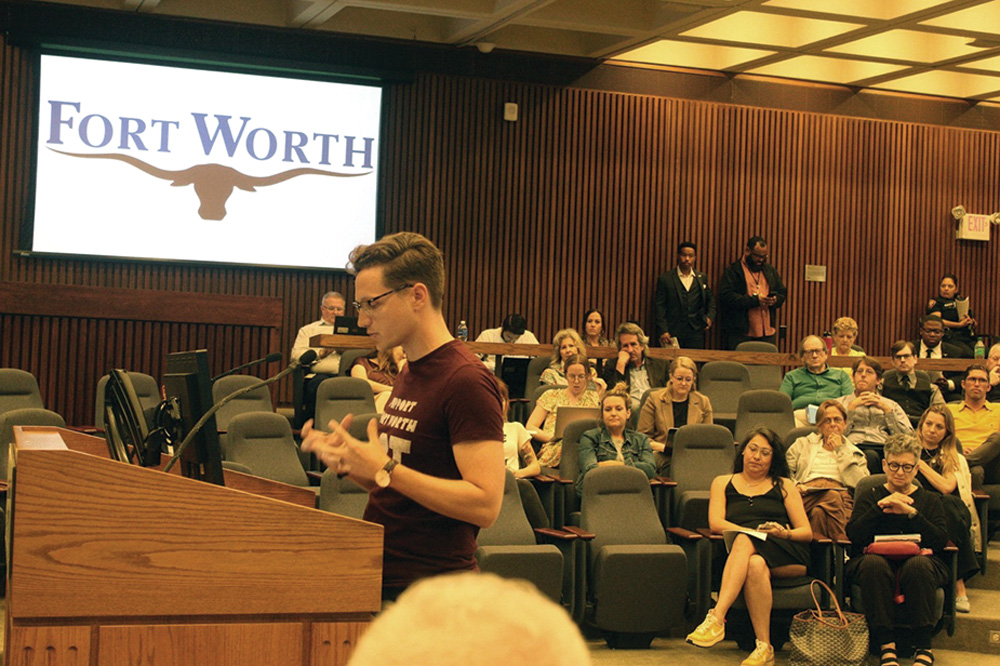
Photo by Edward Brown
Before the vote, local artist Bernardo Vallarino told councilmembers that he worries public-private partnerships could infringe upon artists’ free speech.
“Private entities may not like what I do,” he said, referring to his recent pieces that depict handguns as penises. “Our First Amendment can be easily put aside because of those” special interests.
In a state that routinely places gun rights over the lives of school children, Vallarino’s works are an affront to the culture of death embraced by state leaders whose campaigns are partly funded by the NRA. Vallarino’s mistrust of private interests is not unfounded. The ACLU characterizes private-public partnerships as a threat to free speech. Citing public spaces managed by private companies in Detroit, Michigan, the civil liberties group said, “Though public spaces, private security is at liberty to prevent activists and organizations from protesting and speaking in support of their cause as it sees fit.”
The ACLU believes the 2014 disbanding of Black Lives Matter protestors in Minneapolis’ Mall of America as an example of private interests abusing law enforcement to block free speech.
“Mall authorities and police disbanded the protest and stated days later their intentions to pursue criminal charges and seek payment for lost revenue,” ACLU said. “Though the mall was created in part by and continues to thrive on millions of dollars in public subsidies, its private ownership allows it to criminalize protesters deemed unfit.”
The 2020 unrest following the murder of George Floyd tested the limits of free speech downtown, which is mostly owned by the Bass family. We noted a discernible change in policing practices that summer when protestors began entering buildings on and around privately owned Sundance Square. After several days of flooding West 7th Street business and area parks, going inside businesses and marching, BLM supporters turned their attention to Sundance Square. While both areas are owned by separate private companies, the political influence of the Bass family appeared to change the behavior of local law enforcement.
“While police have not intervened on West 7th,” we said, “protest organizers used last night to see if police response would be different when the same tactics were employed in areas where mayor ‘Betsy Price eats.’ Fort Worth police placed officers between protesters and downtown business entrances, a departure from their handling of the West 7th corridor.”
Without force, police kept protestors from entering downtown establishments.
In a city as large as Fort Worth, it is easy to forget that public grounds in densely populated areas are increasingly rare, as green spaces along West Magnolia Avenue and elsewhere have been replaced with developments. The Fort Worth Community Arts Center is one of a few local tax-funded properties with high public visibility and a commitment to free thought and speech. The city’s effort to open that vital public space to private interests comes at a time when the county’s top leaders have aligned themselves with a well-moneyed Christian Nationalism movement that has successfully installed right-wing zealots in office. The worldviews of County Judge Tim O’Hare, Sheriff Bill Waybourn, and District Attorney Phil Sorrells save no room for anyone outside of their racist, heteronormative, Fox “News”-influenced beliefs, and spaces like the Fort Worth Community Arts Center are where progressive notions of equality and justice can persist in the face of institutionalized oppression.
Last week, Mayor Mattie Parker pledged to only support a development plan that maintains space for galleries and a theater at 1300 Gendy St. Her actions appeared to placate some boisterous artists.
For the two dozen locals who spoke at city council last week and their supporters, the fight over the fate of the arts center is less a struggle to preserve a building and more a battle to maintain a space where freedom of expression can be preserved in a state that remains openly hostile to anyone who isn’t white, wealthy, straight, and Christian. Every dollar gained through private interests should be weighed against the potential loss of First Amendment rights. City leaders have already relinquished their duty to protect freedom by not adequately funding Arts Fort Worth. Now the final battle has fallen to the hands of a small civic-minded group of arts advocates who remain understandably skeptical that corporate interests will ever care about anything other than the bottom line.
This column reflects the opinions of the editorial board and not the Fort Worth Weekly. To submit a column, please email Editor Anthony Mariani at Anthony@FWWeekly.com. He will gently edit it for clarity and concision.



